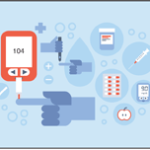 by Swapnajeet Sahoo, MD; Aseem Mehra, MD; and Sandeep Grover, MD
by Swapnajeet Sahoo, MD; Aseem Mehra, MD; and Sandeep Grover, MD
All from the Department of Psychiatry at the Postgraduate Institute of Medical Education and Research in Chandigarh, India
Innov Clin Neurosci. 2016;13(11–12):25–27.
Funding: No funding was received for the preparation of this article.
Financial disclosures: The authors have no conflicts of interest relevant to the content of this article.
Key words: Acute psychosis, organic psychosis, diabetes mellitus, hyperglycemia
Abstract: Although psychiatric manifestations in the form of delirium, confusional states, and psychosis have been commonly reported in relation to hypoglycemia, association of hyperglycemia with psychiatric manifestations has been less commonly reported. In this case report, we present the case of a 36-year-old woman suffering from Type 1 diabetes mellitus who developed recurrent episodes of psychosis following poor adherence to her insulin therapy, leading to significantly high levels of blood glucose. Adequate control of blood glucose levels by improving the adherence with insulin led to lack of recurrence of psychosis.
Introduction
Hyperglycemia has been defined by the World Health Organization (WHO) as fasting blood glucose levels greater than 7.0mmol/L (126mg/dL) and/or post-prandial blood glucose levels greater than 11.0mmol/L (200mg/dL) two hours after meals.[1] Hyperglycemia is a diagnostic feature of diabetes mellitus (Types 1 and 2). Acute hyperglycemia is known to alter mood state and impairs cognitive performance in patients with diabetes mellitus.[2,3] Patients with diabetes mellitus experiencing ketoacidosis or hypoglycemia have also been shown to experience delirium.[4–6] However, association of acute psychosis (in the absence of cognitive disturbances) with hyperglycemia has not been reported. We present the case of a patient suffering from Type 1 diabetes mellitus (T1DM) who developed recurrent episodes of short lasting psychosis that was associated with acute hyperglycemic episodes.
Case Presentation
A 36-year-old woman from an urban background presented with acute onset psychotic illness of 15 days duration precipitated by poor adherence to insulin therapy. The patient had a history of T1DM since the age of 12 years, with a well-adjusted pre-morbid personality and no family history of mental illness. Detailed exploration of the history revealed that she had experienced 3 to 4 similar psychotic episodes, each lasting for 7 to 10 days, over the last seven months, during which she would exhibit symptoms of persecution, delusion of grandiosity, smiling and muttering to herself, emotional liability, abusive behavior, angry outbursts, excessive grooming, increased religiosity, poor self-care, decreased sleep, and decreased appetite. During these episodes, there would be no clouding of consciousness, disorientation, diurnal variation in symptoms, or disturbance of other cognitive functions. All of the psychotic episodes had temporal correlation with poor adherence to insulin therapy and a rise in fasting blood glucose levels from normal range to 300mg/dL. The psychotic episodes had no associated histories of fever, infection, high caloric intake, or substance abuse. During the index episode, her fasting blood glucose levels were in the range of 300 to 515mg/dL and post-prandial blood glucose levels were 398mg/dL. All other lab work results, including those for ketoacidosis, were within normal ranges. Magnetic resonance imaging (MRI) of her brain and physical examination did not reveal any abnormality in the patient, and on mental status examination, she was well-oriented to time, place, and person; her mini mental state examination score was 27/30. She had increased speech output, labile affect, delusion of persecution, delusion of reference, distractibility, and absent insight. Differential diagnosis of acute and transient psychosis and organic psychosis were considered. Management involved use of insulin to normalize the blood glucose levels (appropriate dosing on a 7-point sliding insulin scale) along with use of trifluperazine 15mg/day and clonazepam 0.5mg/day. With these interventions, her blood glucose levels normalized and psychotic symptoms resolved over the period of one week. The psychotropics were then gradually tapered down and then stopped after three months. After about six months following this episode, the patient again presented with similar psychotic symptoms, and these again had temporal correlation with poor adherence to insulin and a rise in blood glucose level. Following this, a final diagnosis of organic psychosis was considered and her psychosis was managed with benzodiazepines and insulin. The psychosis again resolved after a period of five days with the normalization of blood glucose levels. The patient was educated on the importance of adherence to her insulin therapy. Over the following year, the patient was adherent with insulin therapy and did not have any recurrence of psychotic symptoms.
Discussion
It is well known that hypoglycemia can lead to psychiatric symptoms ranging from delirium and confusional states to psychosis.[6–11] In a case series of six patients who developed new onset diabetes mellitus following an acute psychotic breakdown without any other identifiable cause, the authors posited that the lack of glucose control in these patients may have contributed to the development of the psychosis.[12] It has also been suggested that intensive glycemic control therapy in patients with diabetes can lead to neuroglycopenia and precipitate psychosis.[10,11]
The development of psychosis with hyperglycemia has rarely been reported, which likely contributes to the lack of evidence-based information on the exact mechanism of action for the association. It is possible that the same factors that contribute to hyperglycemia also contribute to the development of psychosis. The association of psychosis with acute and chronic stress is well known, and stress is known to be associated with hyperglycemia and the unmasking of diabetes mellitus, possibly through the glucocorticoid pathways. Studies that evaluate cortisol levels in patients with diabetes who develop psychosis would be worthwhile in order to understand the association of hyperglycemia with psychosis.
Limitation. We did not use a standardized diagnostic tool in our case, which limits our conclusion. However, the temporal associations between psychosis and increased blood glucose levels and the resolution of psychosis with normalization of blood glucose levels observed in our patient strongly suggest her psychotic episodes were the direct result of being in a hyperglycemic state. The occurrence of multiple similar episodes of acute-onset psychosis that resolved following normalization of blood glucose levels along with detailed investigations that ruled out delirium, diabetes ketoacidosis, hyperosmolar syndrome, brain pathology, and drug toxicity further support our conclusion.
Conclusion
Clinicians should consider inadequate glycemic control as a potential cause of acute-onset psychotic episodes in patients with diabetes. Our case highlights the importance of first stabilizing these patients’ glycemic levels before prescribing antipsychotics, especially atypical antipsychotics, which may exacerbate hyperglycemia and thus potentially worsen the psychosis. If other pathologies are ruled out and an association between hyperglycemia and psychotic symptoms is established, these patients may benefit from benzodiazepines, as these drugs will not exacerbate hyperglycemia and may help calm the patients until glycemic levels are normalized. Accordingly, prospective research that examines the temporal and causal relationship between psychosis and diabetes mellitus is warranted.
References
1. World Health Organization. Definition and diagnosis of diabetes mellitus and intermediate hyperglycaemia. WHO2006. http://www.who.int/diabetes/publications/diagnosis_diabetes2006/en/. Accessed February 2016.
2. Sommerfield AJ, Deary IJ, Frier BM. Acute hyperglycemia alters mood state and impairs cognitive performance in people with type 2 diabetes. Diabetes Care. 2004;27(10):2335–2340.
3. Cox DJ, Kovatchev BP, Gonder-Frederick LA, et al. Relationships between hyperglycemia and cognitive performance among adults with type 1 and type 2 diabetes. Diabetes Care. 2005;28(1):71–77.
4. Cebeci AN, Güven A. Delirium in diabetic ketoacidosis: a case report. J Clin Res Pediatr Endocrinol. 2012;4(1):39–41.
5. Cryer PE. Hypoglycemia in Type 1 diabetes mellitus. Endocrinol Metab Clin North Am. 2010;39(3):641–654.
6. Fishbain DA, Rotundo D. Frequency of hypoglycemic delirium in a psychiatric emergency service. Psychosomatics. 1988;29(3):346–348.
7. Budner LJ. Behavioral effects of hypoglycemia. J Am Acad Child Adolesc Psychiatry. 1997;36(12):1651–1652.
8. Knezevi´c A. Hypoglycemia and states of confusion. Med Pregl. 1990;43(5-6):221–223.
9. Knezevi´c A, Hrnjakovi´c L. Hypoglycemia–a delirious state with vestibular hallucinations. Med Pregl. 1991;44(5-6):231–232.
10. Roos U, Carlsson G. Acute psychosis caused by hypoglycemia. Läkartidningen.1984;81(49):
4645–4646.
11. Singh SK, Agrawal JK, Srivastava AS, et al. Acute psychotic disorder and hypoglycemia. Indian J Psychiatry. 1994;36(2):93–94.
12. Bauer LK, Wulsin LR, Guadagno G. Acute psychosis and type 2 diabetes mellitus: Should screening guidelines be revised? Prim Care Companion CNS Disord. 2011;13(1).




